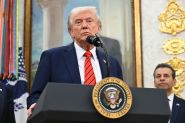- Home
- Middle East
- Panic Deepens on Asian Markets as World Scrambles to Temper Trump Tariffs

©ISAAC LAWRENCE/AFP
Asian markets took a huge plunge Monday as US futures pointed to significant losses on Wall Street over Donald Trump's punishing tariffs, even as countries sought compromise with the defiant president.
Trump denied Sunday he was intentionally engineering a selloff and insisted he could not foresee market reactions, saying he would not make a deal with other countries unless trade deficits were solved.
"Sometimes you have to take medicine to fix something," he said of the market pain that has seen trillions of dollars wiped off the value of US companies since the beginning of his tariff rampage.
Speaking to reporters aboard Air Force One, he added that he had sought to resolve the issue with world leaders over the weekend, claiming "they're dying to make a deal."
China retaliated against the United States on Friday, announcing it would impose tit-for-tat tariffs of 34 percent on all US goods from April 10 after Asian markets closed last week.
With the trade war escalating, stocks in Asia took a heavy hammering when trading resumed.
In early trade on Monday in Japan the Nikkei 225 was off an eye-watering 6.5 percent, while stocks in Taiwan were down almost 10 percent and in Singapore 8.5 percent.
Futures contracts for the New York Stock Exchange's main boards were sharply down Sunday, suggesting more pain for battered Wall Street stocks when markets open Monday, while US oil dropped below $60 a barrel for the first time since April 2021.
Benjamin Netanyahu, the prime minister of Israel -- which has been hit with 17 percent tariffs, despite being one of Washington's closest allies -- will fly in for crunch talks with Trump Monday on the levies.
Britain's Prime Minister Keir Starmer warned in a newspaper op-ed that "the world as we knew it has gone," saying the status quo would increasingly hinge on "deals and alliances."
Trump's staggered deadlines have left space for some countries to negotiate, even as he insisted he would stand firm and his administration warned against any retaliation.
"More than 50 countries have reached out to the president to begin a negotiation," Kevin Hassett, head of the White House National Economic Council, told ABC's This Week on Sunday, citing the US Trade Representative.
Vietnam, a manufacturing powerhouse that counted the US as its biggest export market in the first quarter, has already reached out and requested a delay of at least 45 days to thumping 46 percent tariffs imposed by Trump.
Hassett said countries seeking compromise were doing so "because they understand that they bear a lot of the tariffs," as the administration continues to insist that the duties would not lead to major price rises in the United States.
"I don't think that you're going to see a big effect on the consumer in the US," he said.
Treasury Secretary Scott Bessent also told NBC's Meet the Press that 50 countries had reached out.
But as for whether Trump will negotiate with them, "I think that's a decision for President Trump," Bessent said.
"At this moment he's created maximum leverage for himself... I think we're going to have to see what the countries offer, and whether it's believable," Bessent said.
Other countries have been "bad actors for a long time, and it's not the kind of thing you can negotiate away in days or weeks," he claimed.
Despite hopes for negotiations to avert the worst economic carnage, in Asia the markets bloodbath continued into the new trading week.
In Saudi Arabia, where the markets were open Sunday, the bourse was down 6.78 percent -- the worst daily loss since the Covid-19 pandemic, according to state media.
Larry Summers, formerly Director of the National Economic Council under president Barack Obama, said "there is a very good chance there's going to be more turbulence in markets the way we saw on Thursday and Friday."
Peter Navarro, Trump's tariff guru, has pushed back against the mounting nervousness and insisted to investors that "you can't lose money unless you sell," promising "the biggest boom in the stock market we've ever seen."
Russia has not been targeted by the latest raft of tariffs, and Hassett cited talks with Moscow over its invasion of Ukraine as the reason for their omission from the hit list.
On Wednesday a White House official suggested the reason for Russia's omission was because trade was negligible thanks to sanctions.
Trump has long insisted that countries around the world that sell products to the United States are in fact ripping Americans off, and he sees tariffs as a means to right that wrong.
"Some day people will realize that Tariffs, for the United States of America, are a very beautiful thing!" Trump wrote on Truth social Sunday.
But many economists have warned that tariffs are passed on to consumers and that they could see price rises at home.
With AFP
Read more



Comments